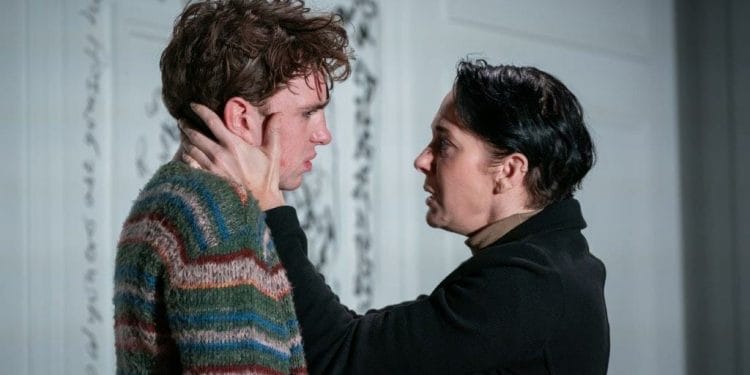 Transferring from The Kiln Theatre, Florian Zeller’s The Son follows The Father and The Mother, both staged in London in recent years, as the final part in this quasi-trilogy about a single family. As with those previous works, The Son, now at The Duke of York’s Theatre, is translated by Christopher Hampton and under Michael Longhurst’s direction is a portrayal of family life that will leave you reeling.
Transferring from The Kiln Theatre, Florian Zeller’s The Son follows The Father and The Mother, both staged in London in recent years, as the final part in this quasi-trilogy about a single family. As with those previous works, The Son, now at The Duke of York’s Theatre, is translated by Christopher Hampton and under Michael Longhurst’s direction is a portrayal of family life that will leave you reeling.
The son is Nicolas, a teenager with depression. We find out at the same time as his father, Pierre, that he hasn’t been to school in three months, and there’s evidence of self-harm. His mother doesn’t know what to do next, and so Nicolas is sent to live with his father and his new partner, who are themselves still adjusting to life with a baby son.
What is striking is the number of times Nicolas says “I’m not well” and it’s dismissed or ignored as if he’s a child feigning a tummy ache to get out of gym class. This is just one of the ways The Son highlights the lack of understanding around depression, especially in the young. Pierre is always looking for a rational explanation, putting his son’s behaviour down to a romantic mishap. He also reflects back on his own difficult upbringing, and how he fought his way through it – he’s doing everything but telling Nicolas to ‘man-up’, and it tragically demonstrates just how out of their depth the parents, tenderly played by John Light and Amanda Abbington, truly are.
Where this play differs from the others, is the way in which the titular character has a profound effect on those around him. His actions and their consequences are often mirrored elsewhere, particularly in his father, creating an often ferocious dynamic. Perhaps the more interesting relationship comes between Nicolas and Sophia (Amaka Okafor), while Nicolas clearly blames her for the break-up of his parent’s marriage, he seems to occasionally soften in his attitude towards her, and it is Sophia who so often has to clean up the mess, both literally and figuratively.
The pain that Nicolas is feeling is clearly etched on the face of Laurie Kynaston, as he paces the floor, curls up in a ball, or explodes in anger, the audience are left in no doubt to the torment felt by the character, you can practically see the weight of the world pulling Kynaston’s shoulders down to the floor. It’s a blistering performance which is as riveting as it is devastating.
Lizzie Clachan’s white walled set reveals a Parisian apartment, and with the addition of Nicolas’s belongings manages to convey both the chaos and emptiness of his life. Nicolas scrawls across the walls in thick black marker; cry’s for help that go unanswered.
Anyone who has experienced, or been affected by, depression will see that this play is a shockingly accurate representation of not just the illness, but the attitudes and miscomprehension that so often surrounds it. The Son is more than a play, it’s a lesson that all we all need to learn, and the sooner the better.





















